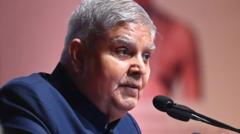The political atmosphere in India is charged with accusations of electoral fraud, with opposition parties asserting that there have been irregularities favoring the ruling BJP in the 2024 elections. Rahul Gandhi leads the charge against the Election Commission's integrity, prompting a heated parliamentary response.
Allegations of Electoral Fraud Spark Controversy in India's 2024 Elections

Allegations of Electoral Fraud Spark Controversy in India's 2024 Elections
Opposition claims of 'vote theft' against India's Election Commission raises tensions as parliamentary proceedings are disrupted.
A significant political controversy has erupted in India, ignited by accusations of "vote theft" that have put the integrity of the 2024 elections in question. Allegations from opposition parties claim that the Election Commission of India (ECI) orchestrated irregularities that disproportionately benefited the Bharatiya Janata Party (BJP), leading to a turbulent political climate.
On Tuesday, legislative sessions were abruptly adjourned after opposition members insisted on a discussion regarding the sanctity of the electoral process. This surge in rivalry peaked when numerous opposition figures, including prominent Congress leader Rahul Gandhi, were briefly apprehended by police in New Delhi, attempting to approach the ECI's headquarters.
Gandhi has been at the forefront of these accusations since a press conference on August 7, where he scrutinized electoral data suggesting widespread manipulation during the parliamentary elections. According to him, this included the identification of over 100,000 questionable entries in the voter list of Mahadevapura in Bangalore Central. He pointed to specific cases of individuals purportedly voting multiple times, claims that the Election Commission openly disputes.
Prime Minister Narendra Modi's BJP secured a notable third term in the elections; however, they did not achieve the overwhelming majority anticipated. Voter turnout reached 66%, with nearly a billion registered voters participating.
The Congress party leader insists that disorganization within voter registrations cost them approximately 48 parliamentary seats, arguing that the electoral system has failed to uphold the basic tenet of "one man, one vote." Despite these claims, the ECI, along with the BJP, has firmly dismissed Gandhi's accusations, branding them as unfounded and demanding he provide tangible proof.
In response to Gandhi's allegations, the ECI took to social media to denounce them as "absurd," while BJP officials labeled his tactics as detrimental to democracy. The ongoing disputes coincide with disputes over the electoral roll revision process in Bihar, where a significant revision has seen the removal of millions from the voter list. Critics assert that this hurried effort disproportionately affects migrants and minority groups, raising concerns over disenfranchisement.
Amidst ongoing litigation in the Supreme Court challenging the voter roll revisions, the ECI continues its efforts to enhance voting integrity. However, public trust seems to be eroding as allegations persist. Gandhi has also called for the release of digital voter rolls for further scrutiny, intensifying the demand for transparency in India's electoral process.



















